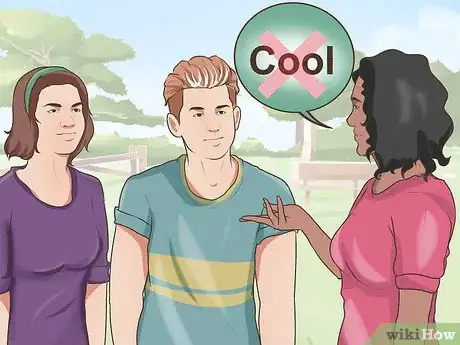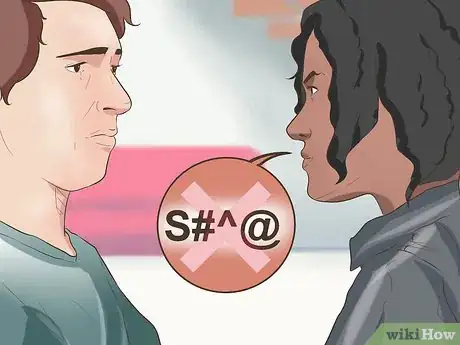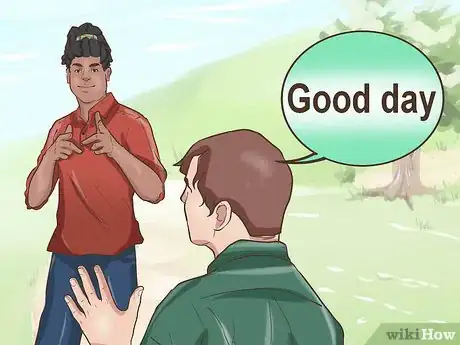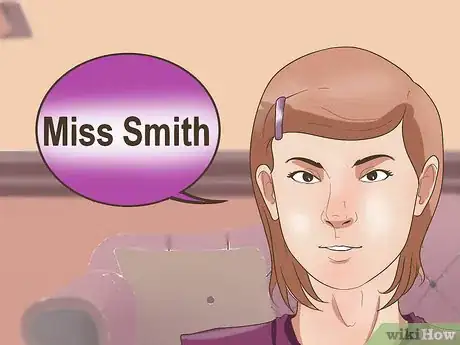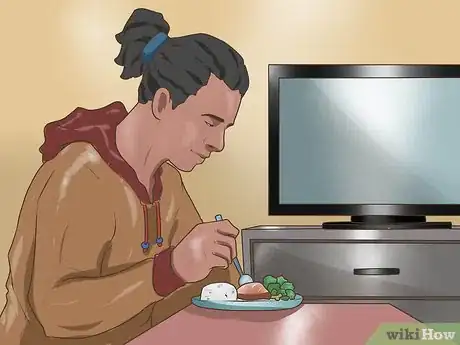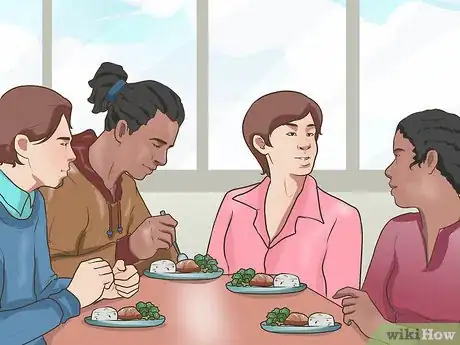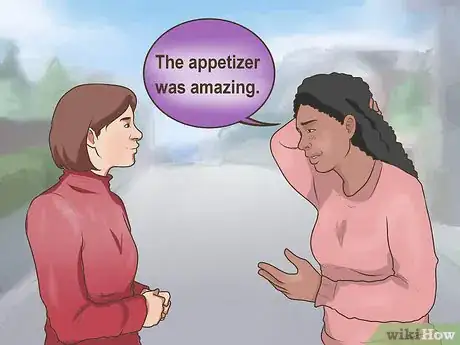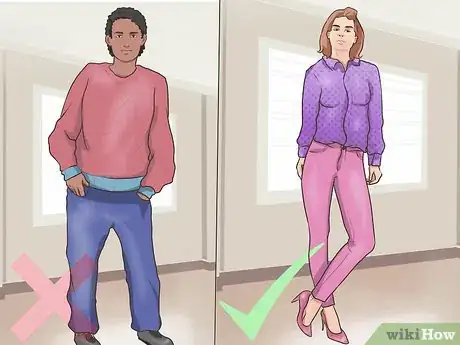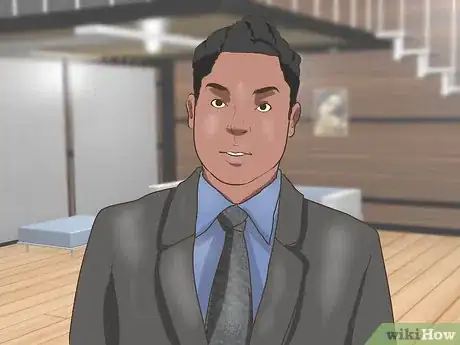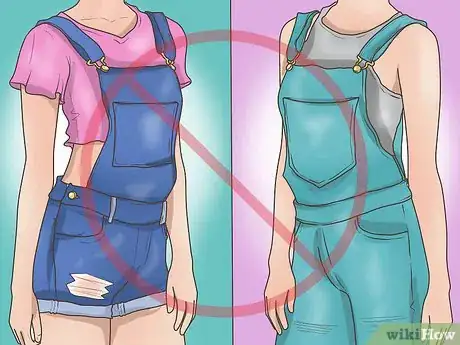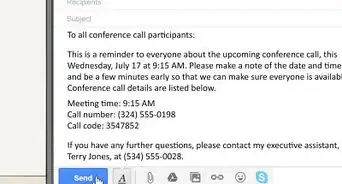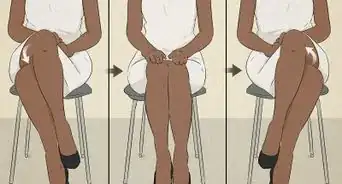This article was co-authored by Tami Claytor. Tami Claytor is an Etiquette Coach, Image Consultant, and the Owner of Always Appropriate Image and Etiquette Consulting in New York, New York. With over 20 years of experience, Tami specializes in teaching etiquette classes to individuals, students, companies, and community organizations. Tami has spent decades studying cultures through her extensive travels across five continents and has created cultural diversity workshops to promote social justice and cross-cultural awareness. She holds a BA in Economics with a concentration in International Relations from Clark University. Tami studied at the Ophelia DeVore School of Charm and the Fashion Institute of Technology, where she earned her Image Consultant Certification.
There are 13 references cited in this article, which can be found at the bottom of the page.
This article has been viewed 71,723 times.
There are many different factors that make up formal behavior, including speech, manners, and dress. To act formally, you want to avoid casual language and informal words, practice proper etiquette, and dress in nice, clean, and proper clothes. However, formal behavior also means being polite, mature, and sensitive to the feelings of those around you. There are many situations where formal behavior is appropriate and expected, such as in a job interview, at certain schools, in church, and at specific social events, such as funerals and fancy dinners.
Steps
Using Formal Speech
-
1Avoid informal words. Informal language is the everyday language you use to talk to friends, family, and close acquaintances. Oftentimes, this language includes words and types of words that aren't formal, and these should be avoided in formal speech. Types of words to avoid include:[1]
- Slang and colloquialisms, such as “kids” (use “children”), “bucks” (use “dollars”), and “cool” (say “excellent”)
- Contractions: “she's” (use “she is”), “I'm” (use “I am”), and “don’t” (use “do not”)
- Abbreviations, including “TV” (use “television”), “phone” (use “telephone”), and “info” (say “information”)
- Idioms, such as “piece of cake” (say “simple”) and “miss the boat” (say “missed an opportunity”)
-
2Enunciate properly. Along with not using informal words and slang, you also want to make sure that you enunciate when you're acting formal. Formal speech and behavior are often expected in meetings, in corporate settings, and at non-casual social events, and during these times you want to speak clearly so that people understand you.
- Enunciating means articulating all the parts of a word properly, without dropping syllables. For instance, you would say “singing” and not “singin’”
- To practice your enunciation, practice tongue twisters, such as: “Peter Piper picked a pack of pickled peppers.”[2]
Advertisement -
3Avoid profanities. Many people find curse and swear words offensive, and you shouldn’t use these in formal or even semi-formal speech. When you are behaving in a formal manner, avoid all bad language, including:
- Swear and curse words
- Religious oaths
- Vulgarities
- Rude jokes
-
4Say “please” and “thank you.” Part of using formal language is being polite, and this means using expressions of gratitude. This can be applied in any situation where formal behavior is expected, but these words are always polite to use in any situation.[3]
- Say “please” if you ask somebody for a favor or request. For instance, “Would you please pass the pepper.”
- Say “thank you” if somebody grants a favor, grants a request, or compliments you. For example, “Thank you for providing that reference.”
- You should also say “excuse me” if you're trying to get somebody’s attention, and “pardon me” if you accidentally get in someone’s way.[4]
-
5Greet and bid farewell properly. This means avoiding casual greetings and expressions of farewell, such as “hey,” “hi,” “how’s it going,” and “see ya.” Instead, say things like:
- Formal greetings: “hello,” “good day/morning/evening” “nice to meet you,” and “it is a pleasure to make your acquaintance”[5]
- Formal farewells: “goodbye,” “farewell,” “take care,” and “until we meet again”
-
6Use titles of respect. Titles of respect should be used when addressing people in a formal setting. Use these instead of referring to somebody by their first name. Only used first names for friends and more casual settings, or if the person you're addressing says to.
- To refer to somebody directly, use their last name and a title of respect, such as Mr., Ms., Mrs., or Miss Smith, which are traditional titles of respect for men and women.[6]
- Mr. (“mister”) can refer to any man. Ms. (“miz”) can be used to refer to any adult woman. Mrs. (“missus”) is used to refer to a married woman who wants to be identified as a married woman. Miss is used to refer to younger women or adults who aren't married.[7]
- You can also refer to people as “sir” or “ma’am” when addressing them, especially if you don’t know their last name.
- It’s important to use titles of respect only if you know the person. If you haven't been introduced before, you shouldn’t assume anything about a person’s gender or marital status. While terms like Mr., Ms., sir, and ma’am don’t assume marriage status, they do assume gender.
- For people you don’t know, there are a few ways you can refer to them. For people with certain careers, there are titles of respect you can use, such as “doctor,” “professor,” “officer,” and “reverend.” You can also try the gender-neutral title of respect M. (“em”) used with a last name, such as M. Smith.[8]
Practicing Proper Etiquette
-
1Remove distractions during shared meals. When you're having breakfast, dinner, or another meal where you're eating with other people, put away the cell phones, tablets, and other distractions. This includes when you're at home, at a friend’s house, or out to dinner at a restaurant.[9]
- Removing distractions also means not watching TV or playing video games while eating. When you're at home, make sure everyone who’s eating sits at the table, and turn off all the electronic devices.
- Most people find it acceptable to listen to quiet music while eating. If you want to listen to music during your meals, make sure the volume is low so that people can still talk.
-
2Bring a gift when you're invited to someone’s house. Being invited into somebody’s home is always an honor, whether it’s for a party, casual get-together, or other event. When you go to another person’s house, especially for a party or meal, it’s polite to take a gift for the host. Common host gifts include:[10]
- Wine
- Cheese or fruit plates
- Desserts
- Plants or flowers
-
3Practice proper table manners. Acting formal means practicing proper table manners, even if you're just eating alone or having lunch with your family. However, dining etiquette is especially important in formal situations, in public, and at restaurants.[11] Good table manners include:
- Keeping your elbows off the table
- Asking for people to pass you things you can't reach
- Chewing with your mouth closed
- Waiting for everyone to sit down before eating
- Sitting up straight
- Asking to be excused before leaving the table
-
4Don’t interrupt others. During a formal conversation, it’s polite to allow one person to speak at a time. This means don’t interrupt or talk over others, and wait for people to finish speaking before responding or adding something to the conversation.
- The only time it’s acceptable to interrupt somebody is during an emergency or when you need help.[12]
-
5Say nice things or nothing at all. Negativity doesn’t have a place in formal speech or behavior, so stick with the old adage that if you don’t have anything nice to say, don’t say anything at all.
- To avoid saying things that aren't nice, never comment on another person’s appearance, unless it’s to pay that person a compliment.[13]
- Don’t listen to or spread gossip. If you're involved in a conversation and somebody introduces gossip, change the subject when you have a moment to interject.
- If somebody asks you your opinion about something you don’t like, try to say something nice about an element you appreciated. For example, if you didn’t like a particular meal but did like the appetizer, remark about how good the appetizer was.
-
6Be considerate of other people’s feelings. Along with only saying nice and positive things, you must also think about how your words and actions can impact others. Being formal means being polite and considerate, so you should always strive to be courteous and kind.[14]
- To be considerate of others and their feelings, you must put yourself in their shoes and try to think about how things might affect them. For instance, if you have a friend with a sick father, ask how he’s doing next time you get together with that friend.
- You can also be courteous by doing things like sending “thank you” cards when people give you gifts, keeping promises to people, being on time for meetings and appointments, and apologizing when it’s necessary.
Dressing in Proper Clothes
-
1Wear clean clothes. Part of being formal means dressing in clean, well-fitting clothes that aren't casual. Clean clothes are important for many reasons, including proper hygiene. However, clean clothes also say that you care enough about yourself and others to present your best self in public.
- Always wash your clothes as soon as they become stained or visibly soiled, and never wear dirty clothes.
- Clothes that aren't visibly dirty or smelly still need regular washing.
- T-shirts and undershirts should always be washed after one to two wears, but shirts and blouses can go three or four wears before needing a wash. Office and dress clothes can typically be worn four to five times before washing.[15]
-
2Wear clothes that fit properly. Opt for clothes that are tailored for your body, but not form-fitting. Avoid clothes that are too tight, loose, long, and short.[16]
- Know your clothing size for shirts, pants, and blazers, and don’t try to squeeze into something a size smaller or hide under something a size larger.
-
3Wear proper clothes. Clothing comes in many levels of formality, including casual, business casual, semiformal, formal, black tie, and white tie. To dress properly instead of casually but without being overly formal, wear things like:[17]
- For men: button-down shirts with cuffs and collars, suits, vests, ties, and dress shoes or loafers.
- For women: dress shirts or blouses, suits with either pants or skirts, dresses, and high or low heels.
-
4Don’t wear clothes with rips or holes. Wearing clothes that are in good repair is just as important as wearing clean clothes. Dressing formally doesn’t always mean wearing a suit or dress suitable for a ball, but it does mean looking professional and presentable.
- Despite the current fashions, don’t wear jeans with rips or tears.
Expert Q&A
Did you know you can get expert answers for this article?
Unlock expert answers by supporting wikiHow
-
QuestionHow should I eat at a formal dinner?
 Tami ClaytorTami Claytor is an Etiquette Coach, Image Consultant, and the Owner of Always Appropriate Image and Etiquette Consulting in New York, New York. With over 20 years of experience, Tami specializes in teaching etiquette classes to individuals, students, companies, and community organizations. Tami has spent decades studying cultures through her extensive travels across five continents and has created cultural diversity workshops to promote social justice and cross-cultural awareness. She holds a BA in Economics with a concentration in International Relations from Clark University. Tami studied at the Ophelia DeVore School of Charm and the Fashion Institute of Technology, where she earned her Image Consultant Certification.
Tami ClaytorTami Claytor is an Etiquette Coach, Image Consultant, and the Owner of Always Appropriate Image and Etiquette Consulting in New York, New York. With over 20 years of experience, Tami specializes in teaching etiquette classes to individuals, students, companies, and community organizations. Tami has spent decades studying cultures through her extensive travels across five continents and has created cultural diversity workshops to promote social justice and cross-cultural awareness. She holds a BA in Economics with a concentration in International Relations from Clark University. Tami studied at the Ophelia DeVore School of Charm and the Fashion Institute of Technology, where she earned her Image Consultant Certification.
Etiquette Coach
-
QuestionHow can I be polite at a formal graduation dinner?
 Tami ClaytorTami Claytor is an Etiquette Coach, Image Consultant, and the Owner of Always Appropriate Image and Etiquette Consulting in New York, New York. With over 20 years of experience, Tami specializes in teaching etiquette classes to individuals, students, companies, and community organizations. Tami has spent decades studying cultures through her extensive travels across five continents and has created cultural diversity workshops to promote social justice and cross-cultural awareness. She holds a BA in Economics with a concentration in International Relations from Clark University. Tami studied at the Ophelia DeVore School of Charm and the Fashion Institute of Technology, where she earned her Image Consultant Certification.
Tami ClaytorTami Claytor is an Etiquette Coach, Image Consultant, and the Owner of Always Appropriate Image and Etiquette Consulting in New York, New York. With over 20 years of experience, Tami specializes in teaching etiquette classes to individuals, students, companies, and community organizations. Tami has spent decades studying cultures through her extensive travels across five continents and has created cultural diversity workshops to promote social justice and cross-cultural awareness. She holds a BA in Economics with a concentration in International Relations from Clark University. Tami studied at the Ophelia DeVore School of Charm and the Fashion Institute of Technology, where she earned her Image Consultant Certification.
Etiquette Coach Try to engage in conversation with the people to your left and to your right. Make sure the conversation is general so that everyone can participate in the discussion, because if it's very niche, then people will be excluded. You want to acknowledge your host and hostess, you can offer a toast to say thank you for inviting us to your home.
Try to engage in conversation with the people to your left and to your right. Make sure the conversation is general so that everyone can participate in the discussion, because if it's very niche, then people will be excluded. You want to acknowledge your host and hostess, you can offer a toast to say thank you for inviting us to your home. -
QuestionHow can I say thank you in a more formal way?
 Tami ClaytorTami Claytor is an Etiquette Coach, Image Consultant, and the Owner of Always Appropriate Image and Etiquette Consulting in New York, New York. With over 20 years of experience, Tami specializes in teaching etiquette classes to individuals, students, companies, and community organizations. Tami has spent decades studying cultures through her extensive travels across five continents and has created cultural diversity workshops to promote social justice and cross-cultural awareness. She holds a BA in Economics with a concentration in International Relations from Clark University. Tami studied at the Ophelia DeVore School of Charm and the Fashion Institute of Technology, where she earned her Image Consultant Certification.
Tami ClaytorTami Claytor is an Etiquette Coach, Image Consultant, and the Owner of Always Appropriate Image and Etiquette Consulting in New York, New York. With over 20 years of experience, Tami specializes in teaching etiquette classes to individuals, students, companies, and community organizations. Tami has spent decades studying cultures through her extensive travels across five continents and has created cultural diversity workshops to promote social justice and cross-cultural awareness. She holds a BA in Economics with a concentration in International Relations from Clark University. Tami studied at the Ophelia DeVore School of Charm and the Fashion Institute of Technology, where she earned her Image Consultant Certification.
Etiquette Coach
References
- ↑ http://www.espressoenglish.net/formal-semi-formal-and-informal-english/
- ↑ http://www.quickanddirtytips.com/business-career/communication/how-to-stop-mumbling-and-be-heard
- ↑ Tami Claytor. Etiquette Coach. Expert Interview. 29 September 2020.
- ↑ http://www.forbes.com/sites/robasghar/2014/04/22/27-etiquette-rules-for-our-times/#65a88ae761dc
- ↑ http://www.fluentu.com/english/blog/english-greetings-expressions/
- ↑ http://www.talktocanada.com/blog/2-ways-to-talk-casual-and-formal-in-the-english-language/
- ↑ http://www.phrasemix.com/answers/how-should-i-use-titles-like-mr-and-mrs
- ↑ http://genderfork.com/2012/question-alternatives-to-sir-and-maam/
- ↑ http://www.forbes.com/sites/robasghar/2014/04/22/27-etiquette-rules-for-our-times/#65a88ae761dc
- ↑ http://www.forbes.com/sites/robasghar/2014/04/22/27-etiquette-rules-for-our-times/#65a88ae761dc
- ↑ Tami Claytor. Etiquette Coach. Expert Interview. 29 September 2020.
- ↑ http://www.parents.com/kids/development/social/25-manners-kids-should-know/
- ↑ http://www.parents.com/kids/development/social/25-manners-kids-should-know/
- ↑ http://www.cyh.com/HealthTopics/HealthTopicDetailsKids.aspx?p=335&np=287&id=2526
- ↑ http://www.gq.com/story/how-often-you-should-wash-your-clothes
- ↑ https://www.buzzfeed.com/mrloganrhoades/the-ultimate-formal-style-guide-for-men?utm_term=.pfzrGAWxK#.lxogolkxB
- ↑ http://emilypost.com/advice/attire-guide-dress-codes-from-casual-to-white-tie/
